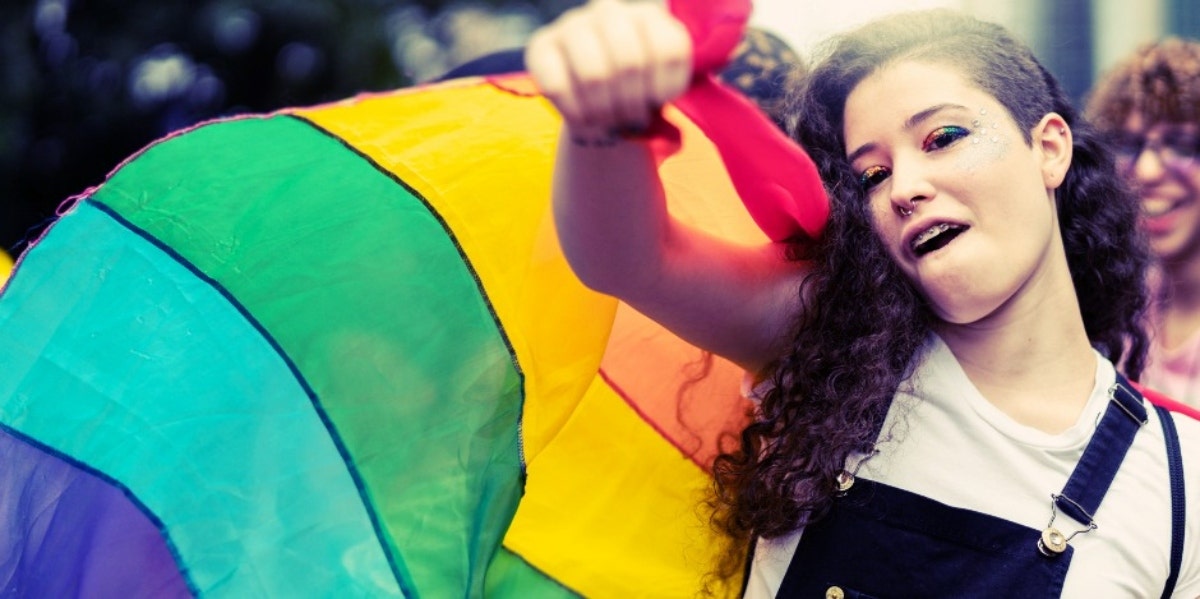What Does The Q Mean In LGBTQ?
How this letter helped bring some people into the community
 GETTY
GETTY The LGBTQA + acronym started out as an expansion of LGB — as activists in the 1990s thought “gay community” didn’t accurately represent all those to whom it referred. But what does the Q mean in LGBTQ?
Q in LGBTQA+ means both queer and questioning.
The acronym has been crucial in bringing groups of different sexualities and gender identities together.
It established solidarity, and it gave a comprehensive umbrella term for people generally unsure of their identity to find a space in the community.
There are a lot of forms (and debate) that come with the term. Some say it should just be LGBT, some argue that the T (transgender) is unnecessary and that the acronym should only include sexuality, not gender identity (as bogus as an idea as that is, considering we wouldn’t have any of the rights we have today if it weren’t for trans women in the 1960s).
Some say that the + should not be included at all, or that the LGBTQA+ should not include asexuals and allies. Some argue that the acronym, on the other hand, is too limiting.
At the end of the day, these debates highlight how the community itself has grown, and how the progress that’s been made has allowed people to have more open, frank, and complex discussions about gender and sexual identity.
The Q in LGBTQ can give some people space to figure stuff out.
According to a 2017 Gallup poll, 4.5% of Americans identify as a member of the LGBTQ community. As people feel more accepted, more people have started to come out and embrace an identity that has been (and continues to, to some extent) intensely stigmatized.
While there is a lot of work to be done out of and within the community, many agree that society has become more accepting in the past decade, with over 92% of surveyed adults believing it to grow even more accepting in the coming years.
The LGBTQA+ community has grown larger, which means people are having much more open-minded and nuanced discussions about gender and sexuality.
Because of these discussions, people are more openly and proudly gay, lesbian, bi, and trans. But more importantly, the nuances that come with gender and sexuality have allowed people to feel more openly unsure about their identity.
People no longer feel that one label has to describe them for the rest of their lives and feel freer to move between different sexual and gender expressions.
The Q in LGBTQA+ used to mean questioning (and to some extent still does!) but has also come to mean queer, to encompass all identities that don’t necessarily fall into LGBT.
While being queer doesn’t necessarily mean you are questioning, the Q in LGBT has given a lot of people space to explore their gender and sexuality without the pressure of a strict label.
The Q in LGBTQ can act as a form of reclamation.
Understandably so, some people have mixed feelings about identifying everyone in the LGBTQ community as the “queer” community.
Queer as a term has had a troubled past. Some people don’t like being called a term they probably had yelled at them in the school hallways.
For a very long time, it was considered a demeaning, homophobic slur. The general rule is that you should just respect the individual person’s feelings on it — wait or maybe ask before using it around them.
However, queer as an identifier can be incredibly helpful to people who have struggled with outside and internalized homophobia.
Similar to how gay was once used as a derogatory term, and now is widely used to describe the community as a whole, being able to use queer can be an act of triumph and reclamation.
According to Fred Sainz, a spokesman for the Human Rights Campaign, queer has become “a badge of honor. It's taking back a word that was once used as a weapon against us.”
Queer being added to the LGBTQA+ acronym shows how language evolves — not just with time, but with changes in power. That still means that it is best to be respectful of how people feel about the term.
The Q in LGBTQ can bring people together
According to “Orange Is The New Black” star Lea Delaria, the biggest issue within the community is the infighting.
“This is the biggest issue we have in the queer community to date and will continue to be the biggest issue until we learn to accept our differences, and that’s the issue,” Delaria tells PrideSource.com. “And part of me believes that this inclusivity of calling us the LGBTQQTY-whatever-LMNOP tends to stress our differences. And that’s why I refuse to do it. I say queer. Queer is everybody.”
Michael Hulshof-Schmidt, executive director of EqualityWorks, a Portland-based organization involved in racial and gender equity, states that what is most important is for “people to self-identify, and for us to believe people when they do identify.”
Identity is huge, and for so long society forced many in the community to call themselves something they weren’t.
That’s why it feels important to have a label that not only finally describes you, but it also feels important to feel included in a community that went through a lot of the same struggles as you.
Schmidt tells Chicago Tribune that he himself identifies as queer. "I'm 50 years old. It was pretty harmful when I was a young child, and I've now become quite fond of it. I think it's a lovely piece of resistance against the dominant discourse."
Jessica Xing is a writer that covers LGBT issues, media, and culture.

